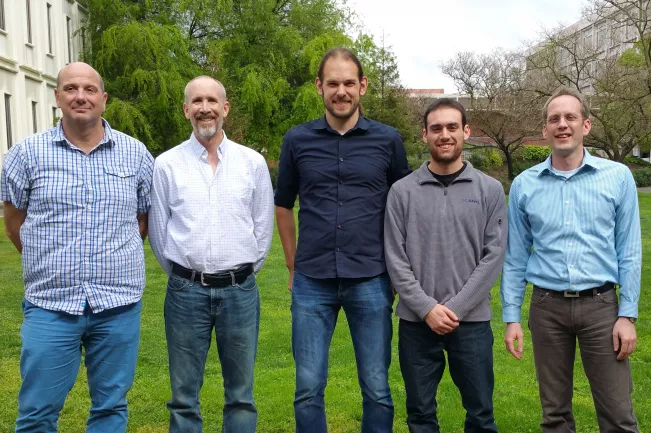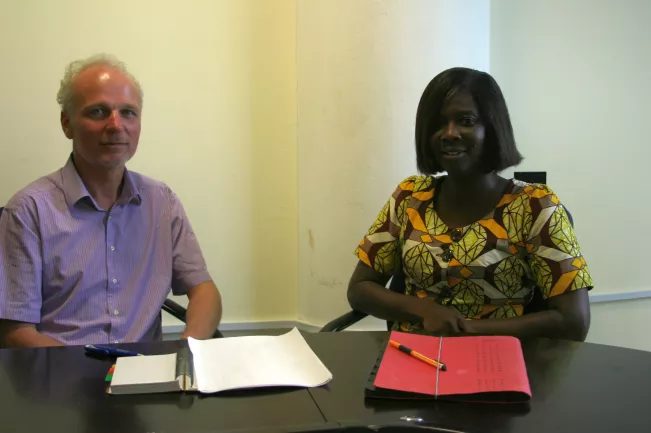Communications and Marketing
International chair for academics from around the world

H-BRS: Professor Bode, you are currently getting the International Chair up and running, a guest lectureship at H-BRS for academics from all over the world. What makes this chair so unique?
Jürgen Bode: A conventional chair is awarded to a person who then holds the position until such time as he or she leaves the institution. Usually the chair also has a specific name relating to its subject area – but with this chair we have chosen to do things differently. The department that wins the request for proposal for the International Chair gets to decide its name.
H-BRS: And the chair is put out to tender on a regular basis?
Bode: Originally our plan was to offer the position once a year, but since at present the chair of the first holder, Karl Kirschner, is only occupied half of the time, we still have funds available to occupy another half position, which means that we will again be requesting proposals in the coming semester.

H-BRS: Dr. Kirschner, you are the first lecturer to hold the International Chair. What do you have planned? What are your ideas?
Karl Kirschner: I am very excited to have been awarded the International Chair position for the coming academic year. This position will enable me to have more contact to bachelor and master students through teaching courses within the EMT department. A personal passion of mine is getting students excited about conducting research. I believe that research is an important component of one's scholarly education, including at the bachelor level. In today's world, research is often done in an international environment and with international collaborations - English being the working language.
With this in mind, I will be offering two new masters and a modified bachelor course that will be taught in English. "Advanced Research Strategies and Dissemination" will cover a range of issues and ethics that are involved in conducting research, and will provide strategies that students can use to personalize their own approach. A new modified version of EMT's "Methods Training" will target bachelor students who are interested in pursuing a master or Ph.D. degree. For the new environmental bachelor study program, my lecture/lab course will teach enough basic quantum mechanics and chemistry that will enable students to model environmentally-relevant molecular interactions. I will also be co-teaching a journalism course to provide an American English perspective.
In addition to strengthening the university's research focus through these new classes, the International Chair will also strengthen my own research efforts. I am a member of the university's research institutes IVC and TREE, and collaborate closely with Profs. Heiden, Hinkenjann (FB02) and Reith (FB03). Towards this end, I am also working on strengthening the Molecular Modeling connections within the university.

H-BRS: Is it possible that the holder of an international guest lectureship might stay longer if nobody else applies, or if the department with the sitting lecturer wins the tender process again?
Bode: The programme is limited to one year, and actually we plan to follow through with this, as we hope to give as many departments as possible the opportunity to avail themselves of the International Chair.
H-BRS: The guest lecturers will mainly teach in English, won’t they?
Bode: As a matter of fact, that is a prerequisite; the post holders should not have German as their mother tongue, but instead come from another country.
H-BRS: How did you have the idea for the chair?
Bode: I once read about a university that, in collaboration with a Brazilian organisation, established a chair for which Brazilian university lecturers could apply. However, this pertained to a particular subject. I took this idea and evolved it to make it transnational and multidisciplinary.
We also have another programme that we regularly offer out to tender, under the name of International Studies. The departments are able to apply to the programme for funding to help them internationalise their courses. The money is primarily intended to establish mobility windows in existing degree programmes and integrate English-language classes. At its heart, however, this programme is not personnel-related, but project-related. With the International Chair my intention was to bring in components of human interaction.
H-BRS: How is the chair financed? Is it from funds originating from the University Development Plan II (HEP II)?
Bode: Yes, the funds come from HEP II, from a “pot” known as the President’s Office Promotional Plan, which encompasses all of the research professorships. In the case of the International Chair, however, only the start-up financing for third party funding comes from the pot, as the German Academic Exchange Service (DAAD) also has a pot for guest lecturers. Universities must furnish a certain contribution themselves and are then able to apply for this funding. The intention is for the department that applies for the International Chair to also apply for funding from the DAAD; the money that does not come from the DAAD is then provided from the Vice President’s pot.
H-BRS: So it seems to me that the idea is to motivate the departments to do something for their international profile, to further the internationalisation of the university? What are your hopes for the International Chair?
Bode: My aim is for the departments to realise that “wow, it’s fantastic having foreign professors here,” and for them to continue seeking to employ foreign professors even after the programme has run its course. We need to catch up here at H-BRS. I hope that in future the tender procedure for research associates and lecturers will also be directed towards foreigners who do not necessarily speak German.
H-BRS: Do you believe that the programme will contribute to attracting more foreign professors to the university?
Bode: Initially I hope that the presence of foreigners will bring about more open-mindedness amongst the staff here. That is the first step. We are currently planning a further call for proposals and hope to support the departments in drawing up an international appointment process. Appointments of this nature require an enormous additional material and bureaucratic effort. So yes, I think and hope that these two measures will lead to us having more research associates and professors from other countries at our university.
H-BRS: Professor Bode, Dr Kirschner, thank you for speaking to us.